
A couple of weeks back, whilst scrolling the internet, I came across Scoot’s flash sale for flights and made the impulsive decision to jump on a flight to Japan. Summer was ending in Japan so it was a cue for me to enjoy the start of Autumn across different locations that I spotted on travel vlogs and blogs.

Accompanying me, Canon was kind enough to send the Canon R50 to capture all sorts of scenery as I went across the Kansai Region to the Kyushu Region. The Canon EOS R50 is a remarkable tool to bridge the gap between smartphone photography and professional-level content production. This versatile APS-C mirrorless camera has proven to be the perfect companion for capturing the beauty and culture of Japan during my recent travels to Osaka, Kyoto, Nagasaki, Kumamoto, and Fukuoka.
So, join me in this article as I document my Summer Japan highlights:
Osaka
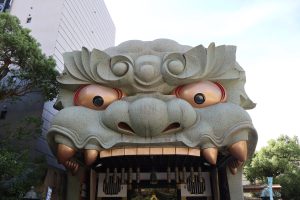

My journey began in Osaka, where I had the opportunity to visit the enchanting Namba Yasaka Temple and bustling Kuromon Market. Namba Yasaka Temple is a serene Buddhist temple located in the heart of Osaka’s Namba district, featuring a unique lion-shaped architecture and a peaceful atmosphere.
The huge lion’s mouth is believed to swallow evil spirits and bring good luck, especially for those looking to do well in school and business matters.
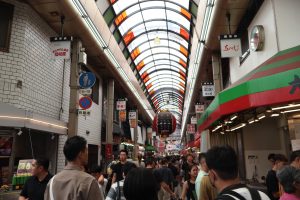
After praying at the shrine, I then head to get lunch at Kuromon Market where visitors can sample a wide variety of Japanese street food and fresh produce. There I had my fair share of fresh seafood and delicacies enjoyed by the Japanese.

Kyoto


After exploring Osaka, it was time for Kyoto. In this leg of my adventure, Kyoto’s Arashiyama Bamboo Forest and Pontocho Historical Street provided picturesque settings for the Canon R50 to capture. Known for its towering bamboo stalks, it is a must-visit place to head to the mesmerizing bamboo grove located in Kyoto’s Arashiyama district. The R50’s Landscape setting and 24.2-megapixel APS-C sensor beautifully captured detailed stills of the calm yet mysterious forest.
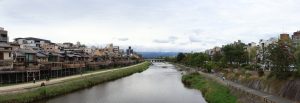
As Kyoto is known for its history, I then headed to the Gion shopping district where I used the Panorama feature to capture the greatness of Kamo-gawa River.

Next, I took a long walk along the famous 500m long narrow Pontocho historical street that runs parallel to Kamo-gawa River. It has gained a reputation for its excellent dining establishments, numerous bars, and vibrant nightlife scene. Additionally, Pontocho is historically significant as a Geisha district.
The Canon EOS R50’s Dual Pixel CMOS Auto Focus II came into play here, effortlessly tracking subjects, even in motion. This proved invaluable for capturing the charm of the historic streets. Continuous shooting at 12fps and 15fps silent electronic shutter ensured that I never missed a moment.
After experiencing the highlights of Kansai at Osaka and Kyoto, I took the bullet train across Japan to the west and arrived at Kyushu where I went to Nagasaki, Kumamoto and Fukuoka.
Nagasaki

You must be familiar with Nagasaki as we all learnt about the tragic past of World War 2. In August 1945, Nagasaki was terrorised by a nuclear attack that rendered the town into ashes. In the present day, Nagasaki is no longer in ruins as we once knew. During this short day trip, Nagasaki’s Sofuku-ji Temple and the stunning night view from Mount Inasa were among the highlights of my trip.

Reflecting Nagasaki’s Chinese heritage, I headed to Sofuku-ji Temple – a historical Chinese-style temple in Nagasaki, known for its intricate architecture and cultural significance. After walking up the flights of stairs, I was greeted with a view that displays how resilient Nagasaki is to have jumped back up on its feet to rebuild such a beautiful city.
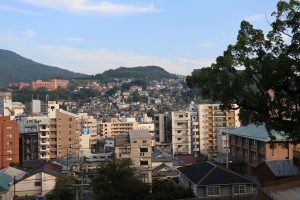
It’s further emphasised after heading up Mount Inasa after dark to experience what they call a Million Dollar View. With the Night Scene feature, I was able to capture the Million Dollar View of the Nagasaki coast.

Not to mention, the panoramic view of the sea, the city and the mountains all in one shot. Toggling across the different creative settings was as easy as 1,2,3 turning the dials and clicking on the buttons.

Kumamoto

After the long day trip to Nagasaki, it was time to head to the city of the Black Bear – Kumamoto. Here I visited Kumamoto Castle, one of the premier castles in Japan and a symbol of resilience. The Canon R50’s high resolution and in-camera image merging ensured that I captured the intricate details of this historic site with precision and clarity.

By using the landscape setting, I was able to capture the details of the historical icon. Its compact size, lightweight build, and comfortable grip make it an ideal travel companion, allowing users to capture moments on the go effortlessly.
Fukuoka
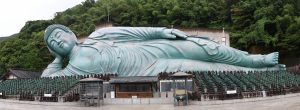
After the two-day trip, it was time to explore the city of Fukuoka. Here I rounded off my journey with Nanzoin Temple and Team Labs Forest.
Home to the largest bronze Reclining Buddha, Nanzoin temple is a lovely peaceful and spiritual destination that is hidden from bustling tourist crowds. The Reclining Buddha’s dimensions are impressive measuring 41 meters in length, 11 meters in height, and weighing in at 300 tons. It was a sight to behold and a simple shot didn’t cut it. To fully capture the grandness of the statue, I had to use the Panorama setting.

Many pilgrims start their Sasaguri Pilgrimage here as the first stop and continue their journey across 3 days to 88 different temples.

After visiting the shrine, it was time to explore interactive museums. A name that most of us have heard of when planning activities in Japan, TeamLab. In particular, TeamLab Forest. It’s an immersive art installation and digital art experience in Fukuoka, where visitors can explore interactive light displays and surreal landscapes in a unique fusion of art and technology.
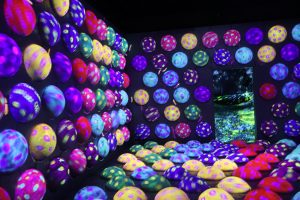
Visitors can experience different rooms of interactive visual arts from capturing virtual animals on screen to jumping around coloured balls to even tightwalking tiny paths. It was an experience like no other. With the scenery changing every few seconds, I heavily relied on the auto feature. Thanks to the high resolution of the 24.2 megapixel APS-C sized sensor and automatic in-camera image merging, my photos came out vibrant and dynamic.
Across the 9 days of continuous travelling, what made things so convenient was the Canon R50’s Wi-Fi and Bluetooth sharing. With this, I was able to quickly import photos during train rides and edit them on the go. This makes sharing memories efficient and hassle-free.

The EOS R50 proved to be a reliable companion during my Japan journey, capturing the essence of each destination effortlessly. From its intuitive controls to its outstanding image and video quality, this camera is indeed the perfect gateway into the world of professional content creation. Whether you are capturing the serenity of a temple or the vibrancy of a bustling market, the Canon EOS R50 is the tool that enables you to tell your story with creativity and precision.
The Canon EOS R50 with RF-S18-45mm F/4.5-6.3 IS STM lens is currently retailing at $1,039.00 at https://shop.sg.canon/.








